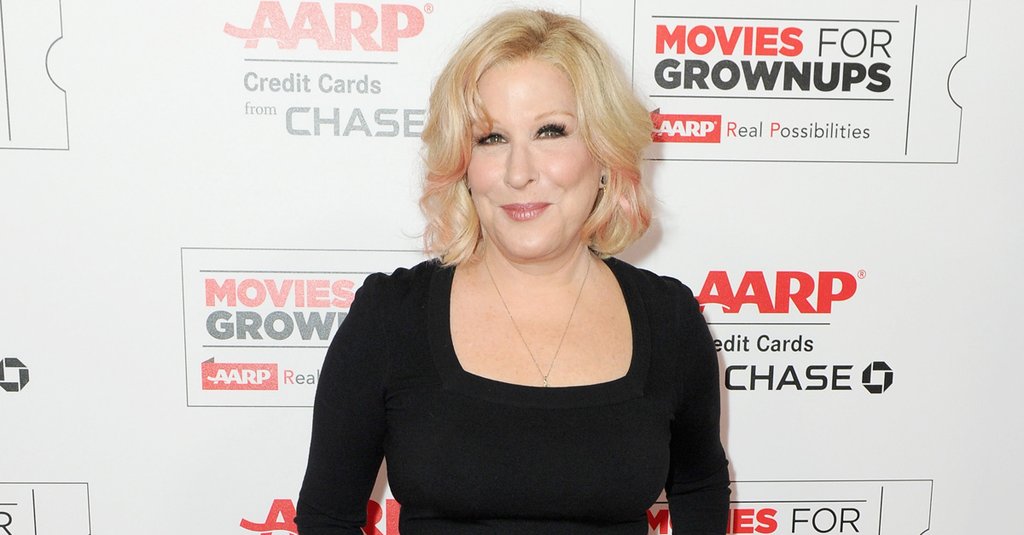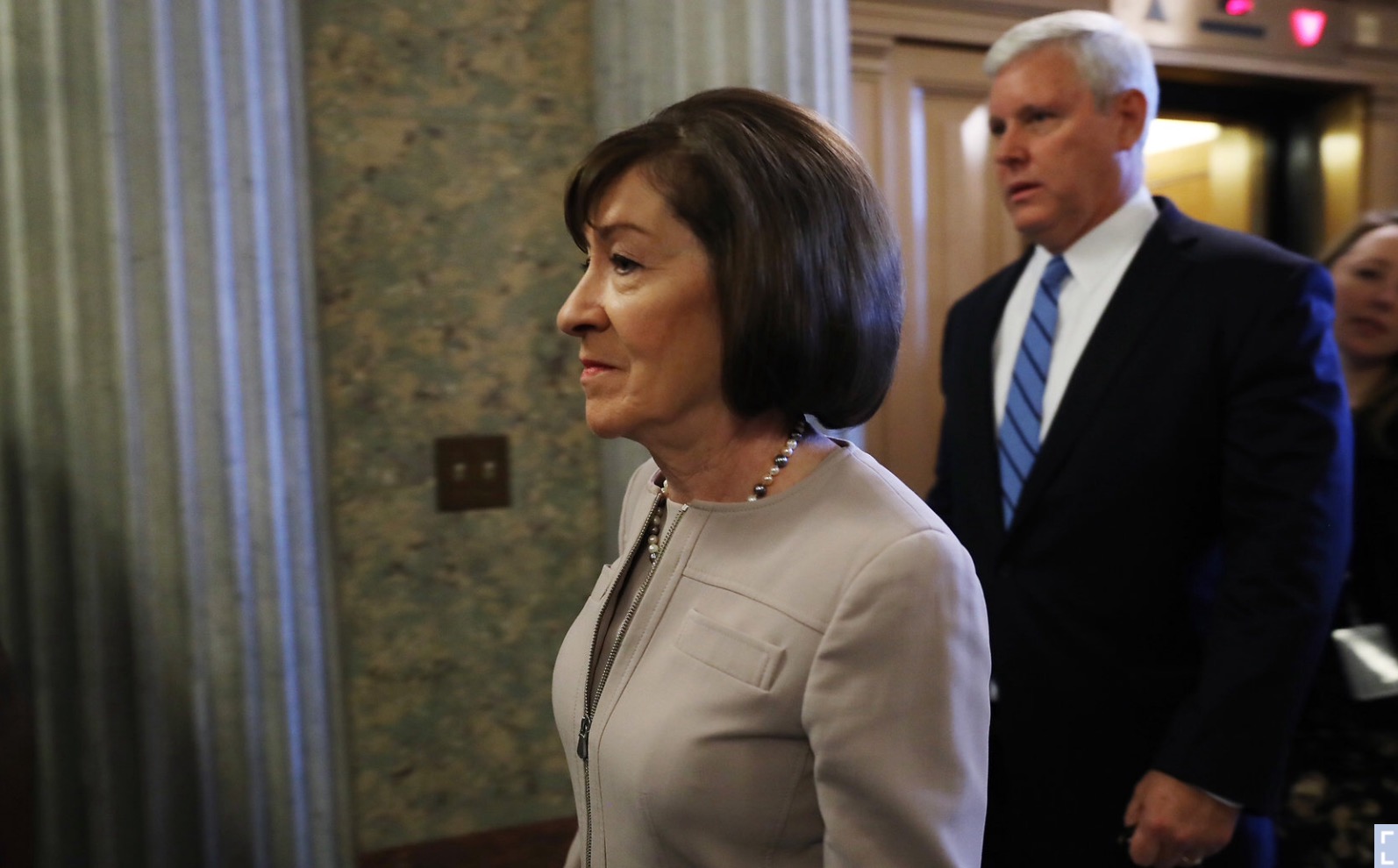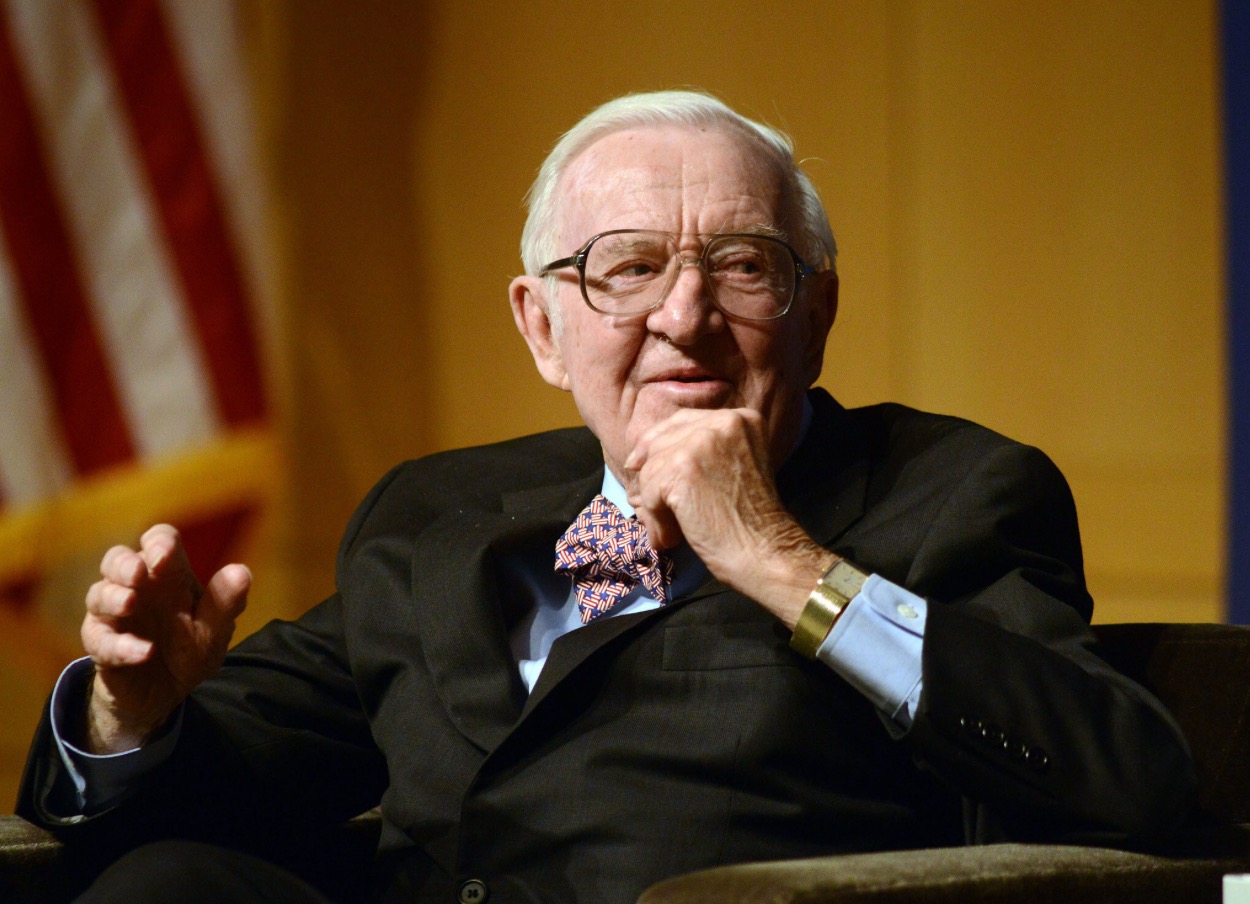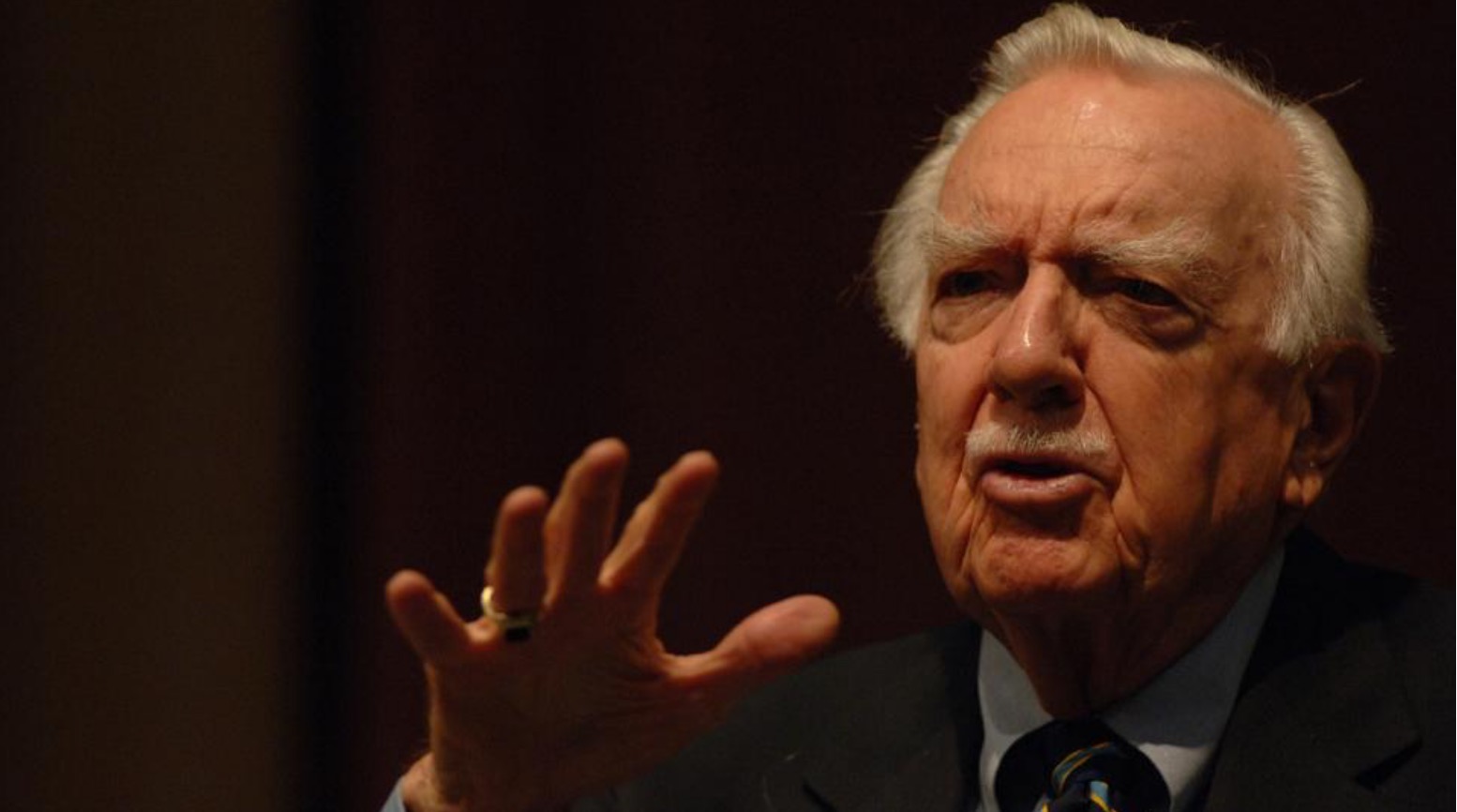Scott Disick & Kris Jenner Slam Kim Kardashian As ‘Scary’ — See Why They’re Afraid To Look At Her
Scott Disick and Kris Jenner bond over their shared fear: Looking Kim Kardashian in the eyes! Find out why they’re so spooked in the sneak peek clip for the Oct. 7 episode of ‘KUWTK,’ here.
A discussion over a birthday gift turns into a revelation for Scott Disick, 35, and Kris Jenner, 62. Kim Kardashian, 37, gives them too much of a reality check — even as the reality television icons of Keeping Up with the Kardashians! While on a lunch outing, Kris reveals to Scott that she’d like to surprise her best friend, Sheila Kolker, with a birthday face lift in a sneak peek clip for the Oct. 7 episode of KUWTK. You know, as a return favor since Sheila was “there every step of the way” for the KarJenner matriarch’s face lift, she tells Scott in the clip below. But the baby daddy to Kris’s daughter, Kourtney Kardashian, 39, isn’t sure if Sheila will be as thrilled about the gesture.
“Even though it’s really a sweet gesture, are you at all nervous that you could offend her in anyway? Is it like, ‘Hey, your face looks old?’” Scott asks Kris. “Just think about it…If you told me that I needed something done, even if maybe I didn’t, I would definitely go stare and look at whatever that was.” And that gives Kris an epiphany. Kim is the metaphorical equivalent of suggesting someone should get a face lift! “Kim does that to me 24/7,” Kris tells Scott, referring to how she makes her self-conscious. And Scott can’t wait to relate — watch their full conversation below!
Scott always tells it as it is! In the last episode of KUWTK, our favorite baby daddy was pretty blunt: He does not in fact want a fourth baby with Kourtney, as he said so himself in the Sept. 30 episode. Once again, Kim’s meddling is to blame! Scott explained to her little sister Khloe Kardashian, 34, his text conversation with Kim in which she claimed he confessed to wanting baby #4. “No, it was more along the lines of her saying how boring Kourtney was, and if she was doing anything right, she would have another kid with you,” Scott told Khloe. And remember — he’s dating Sofia Richie, 20! It turns out Scott was just trying to be a Kim-pleaser. He continued, “You know how it is. When somebody in the family is super passionate about something, you just gotta kinda pretend you’re with it even if you have no idea what they’re really talking about.”
Anyways, we see Scott’s point. A complimentary face lift, although a nice offer, could be a bit offensive. Kris, maybe a gift card is safer?
Article via: Scott Disick & Kris Jenner Slam Kim Kardashian As ‘Scary’ — See Why They’re Afraid To Look At Her
Chance the Rapper pledges $1 million to mental health services in Chicago
Chance the Rapper continues to show his support for Chicagoans in need as he pledged $1 million for mental health in the city Thursday.
He also announced plans to give $100,000 to 20 additional Chicago Public Schools.
Running in to raucous applause, Chance the Rapper took the stage in front of Chicago Public Schools educators, principals, health care experts and the world on his Twitter page with a major announcement for the city.
“I’m proud to announce I am pledging $1 million to mental health services in Chicago,” Chance said to rousing applause and screams of joy.
The new initiative by Chance called “My State of Mind” aims at creating a go-to, modern resource for Chicagoans to learn about and access mental health services.
Members of the Illinois Department of Human Services and the Chicago Department of Public Health were in attendance, among others.
Backing up Chance and his non-profit SocialWorks were big name stars like Tracee Ellis Ross, Black Panther star Chadwick Boseman and even Oprah expressing the importance of mental health.
“We need a new space to get information on how they feel and where they can go,” Chance said.
On Thursday, SocialWorks pledged to give $100,000 to six different mental health providers in the city to start. But that’s not all. Chance’s partnership with Chicago Public Schools just got bigger.
“This year, 20 more schools will get $100K…” Chance said to cheers. “We will be upping the game in terms of equity, in terms of what is rightfully yours. Principals, teachers, we got your back.”
Applications for those mental health grants begin in January.
Learn more by visiting http://www.socialworkschi.org
Article via: Chance the Rapper pledges $1 million to mental health services in Chicago
Bette Midler apologizes after being slammed for calling women ‘the n-word of the world’
Actress and singer Bette Midler sparked social media backlash Thursday night after posting a racially insensitive tweet about feminism, in which she said “women are the n-word of the world,” and the “most disrespected creatures on earth.”
The actress was apparently quoting the title of the 1972 song written by John Lennon and Yoko Ono, which she referred to in a since-deleted post.
Social media was quick to call out Midler, who is white, and remind the actress of American history.
“Fact: Many white women-owned/abused slaves right along with their husbands. Ever seen a lynching picture? Guess what you don’t see: White women crying. Respect American History,” one Twitter user said.
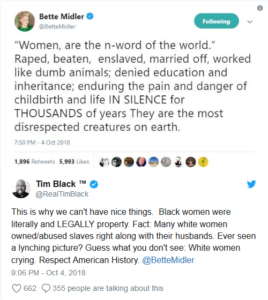
Read more via: Bette Midler apologizes after being slammed for calling women ‘the n-word of the world’
Check out Lovelyti’s video: Kim Kardashian CLAPS BACK @BetteMidler @ChloeGMoretz @piersmorgan for making fun of her N*DE SELFIE
Kavanaugh Passes Critical Senate Hurdle
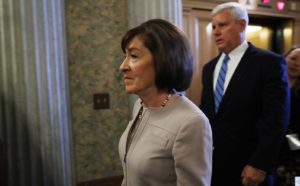
Sen. Susan Collins, R-Maine, arrives on Capitol Hill on Friday. Collins voted to advance Brett Kavanaugh’s nomination, but says she will announce her position for the final vote Friday afternoon.
Updated at 11:48 a.m. ET
Brett Kavanaugh’s nomination to the Supreme Court cleared a key procedural hurdle in the Senate on Friday, 51-49. A final vote on his confirmation is expected as soon as Saturday. President Trump tweeted that he was “very proud” of the Senate for taking the critical step.
One Democrat, Sen. Joe Manchin of West Virginia, voted with Republicans to end debate and move the nomination forward. One Republican, Sen. Lisa Murkowski of Alaska, voted with Democrats against ending debate.
Still, the fate of Kavanaugh’s nomination remains unclear. Sen. Susan Collins, R-Maine, voted to end debate, but said she will announce her final position on whether to confirm Kavanaugh on Friday afternoon. Other senators could switch their votes as well.
In a speech leading up to the vote, Judiciary Committee Chairman Sen. Chuck Grassley, R-Iowa, said “the resistance is located right here on Capitol Hill,'” and he urged his colleagues to “say no to mob rule” by voting to confirm Kavanaugh.
The top Democrat on the panel, Sen. Dianne Feinstein of California, said Republicans have “largely chosen to ignore the testimony” of Christine Blasey Ford, who accused Kavanaugh of sexually assaulting her when they were teenagers.
President Trump, in a tweet Friday morning, criticized what he termed “the very rude elevator screamers,” who he said are “paid professionals only looking to make Senators look bad!” Without evidence, he alleged that the protesters, several of whom said they have been sexual assault victims, were “paid by [financier George] Soros and others.”
The very rude elevator screamers are paid professionals only looking to make Senators look bad. Don’t fall for it! Also, look at all of the professionally made identical signs. Paid for by Soros and others. These are not signs made in the basement from love! #Troublemakers
— Donald J. Trump (@realDonaldTrump) October 5, 2018
Senators had one day to review a confidential supplemental background check into Kavanaugh’s behavior in the early- to mid-1980s when he was in high school and college. The closely guarded collection of interviews is celebrated by Republican leaders as concrete proof that Kavanaugh did not harass or abuse women. Democrats say the interviews, which they originally requested, are incomplete and inconclusive.
“What we know for sure is the FBI report did not corroborate any of the allegations against Judge Kavanaugh,” McConnell said. “The second thing we know for sure is that there’s no way anything we did would satisfy the Democrats.”
Kavanaugh took an unusual step to boost his nomination Thursday evening, writing an op-ed in The Wall Street Journal expressing regret for the heated tone of his testimony before the Senate Judiciary Committee last week, including comments decrying Democratic attacks, that was seen by some wavering senators as too partisan.
“I was very emotional last Thursday, more so than I have ever been. I might have been too emotional at times. I know that my tone was sharp, and I said a few things I should not have said,” Kavanaugh wrote.
The White House defended Kavanaugh’s demeanor during the hearings.
“Any human being who has been falsely accused of a range of things including gang rape has a right to be upset, has a right to be angry, and that’s what we saw last week,” said White House spokesperson Kerri Kupec during an interview with Morning Edition.
McConnell received the 51 votes needed to clear the procedural hurdle on Friday. Republicans have enough votes to assure Kavanaugh’s nomination on their own, but only if they win the support of Collins as well as Murkowski, R-Alaska; and Jeff Flake, R-Ariz., who withheld judgment while the FBI completed its work.
All three spent hours in a secure room in the basement of the Capitol on Thursday reviewing the roughly 45 pages of FBI interviews. Collins and Flake both say the investigation was thorough, but neither would say whether they are now prepared to vote to confirm Kavanaugh.
Flake forced Republicans to launch the additional investigation last week after a tense negotiation with Senate Judiciary Committee Democrats. Flake spent a large portion of the afternoon reviewing the FBI work and said he saw no new evidence to corroborate any of the claims against Kavanaugh, which Flake had previously indicated would mean he will vote to confirm.
Democrats saw something very different in the report. Several criticized Republicans for limiting the FBI investigation to just nine interviews. They said the process ignored many potential witnesses, including Ford.
The FBI also apparently did not interview Kavanaugh.
Senate Minority Leader Chuck Schumer, D-N.Y., said those issues raised serious doubts about Kavanaugh and his qualifications.
“Judge Kavanaugh stated at his hearing that the individuals at the incident involving Dr. Ford refuted her version of events,” Schumer said Thursday. “From their own public statements, we knew that to be false, and nothing in this report changes that.”
Similar concerns moved Sen. Heidi Heitkamp, D-N.D., to announce Thursday that she would oppose Kavanaugh. Heitkamp is one of the most vulnerable Democrats on the ballot in November and has seen her poll numbers slip in recent weeks. She’s running for re-election in a state president Trump won in 2016 by more than 35 points.
Heitkamp said she was troubled by Kavanaugh’s aggressive appearance before the Senate Judiciary Committee and the message his confirmation would send to women and girls across the country.
Kavanaugh Nomination Battle Is Fought With Millions In Secret Cash
“When considering a lifetime appointment to Supreme Court, we must evaluate the totality of the circumstances and record before us,” Heitkamp said in a statement. “In addition to the concerns about his past conduct, last Thursday’s hearing called into question Judge Kavanaugh’s current temperament, honesty, and impartiality.”
Her opposition leaves Manchin, as the only publicly undecided Democrat on final passage. He is also in a tough re-election campaign and was silent on Kavanaugh in the days leading up to the vote.
The nomination now hangs on the decisions of Collins, Murkowski, Flake and Manchin.
READ MORE NPR NEWS
Retired Justice John Paul Stevens Says Kavanaugh Is Not Fit for Supreme Court
WASHINGTON — In an unusual rebuke from a former member of the Supreme Court, Justice John Paul Stevens said on Thursday that Judge Brett M. Kavanaugh was not qualified to sit on the court.
Justice Stevens said he came to the conclusion reluctantly, changing his mind about Judge Kavanaugh’s nomination after the second round of the judge’s confirmation hearings last week. Judge Kavanaugh’s statements at those hearings, Justice Stevens said, revealed prejudices that would make it impossible for him to do the court’s work, a point he said had been made by prominent commentators.
“They suggest that he has demonstrated a potential bias involving enough potential litigants before the court that he would not be able to perform his full responsibilities,” Justice Stevens said in remarks to retirees in Boca Raton, Fla. “And I think there is merit in that criticism and that the senators should really pay attention to it.”
“For the good of the court,” he said, “it’s not healthy to get a new justice that can only do a part-time job.”
At the hearing last week, Judge Kavanaugh used starkly partisan language to describe the accusations against him.
“This whole two-week effort has been a calculated and orchestrated political hit,” he said, “fueled with apparent pent-up anger about President Trump and the 2016 election, fear that has been unfairly stoked about my judicial record, revenge on behalf of the Clintons and millions of dollars in money from outside left-wing opposition groups.”
You have 4 free articles remaining.
Subscribe to The Times
Justice Stevens is 98, and he retired from the Supreme Court in 2010. He was appointed in 1975 by President Gerald R. Ford, a Republican, but he voted with the court’s liberal wing for much of his tenure.
Justice Stevens said he had admired Judge Kavanaugh’s judicial work and had written positively about it in one of his books, “Six Amendments,” which proposed a number of changes to the Constitution. One concerned the Citizens United campaign finance case, in which Justice Stevens had dissented.
In the book, Justice Stevens praised a decision from Judge Kavanaugh. Writing for a three-judge panel of the Federal District Court in Washington, Judge Kavanaugh ruled two foreign citizens living in the United States on temporary work visas could not spend money to call for the election of American politicians.
Justice Stevens said he thought that decision was sound. “As a matter of fact, I put his picture in the book to illustrate my admiration for it,” Justice Stevens said. “At that time, I thought he had definitely the qualifications to sit on the Supreme Court and should be confirmed if he was ever selected.”
“I’ve changed my views for reasons that have really no relationship to his intellectual ability or his record as a federal judge,” Justice Stevens said. “He’s a fine federal judge, and he should have been confirmed when he was nominated.”
“But I think that his performance during the hearings caused me to change my mind,” Justice Stevens said, noting that prominent law professors, including Laurence H. Tribe, a law professor at Harvard, were also critical of Judge Kavanaugh’s statements.
Justice Stevens rejected comparisons to the experience of Justice Clarence Thomas, who endured a bruising confirmation hearing in 1991 after being accused of sexual harassment. “There’s nothing that Clarence did in the hearings that disqualified him from sitting in cases after he came on the court,” Justice Stevens said.
Justice Stevens said he disagreed with Justice Thomas in most important cases but found him to be “a decent and likable person.”
“You cannot help but like Clarence Thomas,” Justice Stevens said, “which I don’t think necessarily would be true of this particular nominee.”
SUBSCRIBE TO THE NEW YORK TIMES FOR MORE
2-year-old sends over $1,000 in cash through shredder
HOLLADAY, Utah (KSL) — A Holladay family is figuring out how to replace more than $1,000 in cash that their 2-year-old son sent through the shredder.
Ben and Jackee Belnap said they had been saving up cash to pay Ben’s parents back for University of Utah football season tickets. They had $1,060 in an envelope ready to go, when that envelope disappeared over the weekend. Ben and Jackee started searching the house.
“I’m digging through the trash and she hollers and says, ‘I found it,’” Ben said. “She’s holding the shredder and she says, ‘I think the money is in here.’”
Jackee said their 2-year-old son, Leo, is familiar with their shredder.
“Leo helps me shred junk mail and just things with our name on it, or important documents we want to get rid of,” she said.
Leo apparently sent the envelope through the shredder sometime when they weren’t looking.
“We just, for like five minutes, we just shuffled through it, not talking. We didn’t know what to do and then I broke the silence and I’m like, ‘Well, this will make a great wedding story one day,’” Jackee said.
It turns out the couple might not be out all that money. There is a government office that deals with mutilated cash.
“I called the guy the next morning and he said, ‘Oh, we might be able to help you here,’ and I was shocked,” Ben said. “He said, ‘Bag it up in little Ziploc bags, mail it to D.C., and in one to two years, you’ll get your money back.’”
Two years might be a long time to wait, but when that money does come back, little Leo will probably still be banned from going anywhere near their shredder.
Video produced by Summer Delaney.
via: https://pix11.com/2018/10/04/2-year-old-sends-nearly-1000-in-cash-through-shredder/
‘Unhappy’ father rigged car to explode, killing 2-year-old son and friend
ALLENTOWN, Pa. – A Pennsylvania father used a homemade explosive device to kill himself, his child and one of his friends, authorities announced Thursday.
“It’s a miracle that no other bystanders were seriously wounded or killed,” said John Gallagher, chief for the Allentown branch of the U.S. attorney’s office. “What happened here in Allentown on Saturday night was nothing short of a nightmare,” he added.
Officials confirmed 26-year-old Jacob Schmoyer was behind Saturday’s explosion that took his life, along with his 2-year-old son, Jonathan, and his 66-year-old friend, David Hallman.
Officials from several law enforcement agencies, including the Bureau of Alcohol, Tobacco, Firearms and Explosives, U.S attorney’s office and Allentown police spoke at a press conference Thursday.
“All three subjects were inside the vehicle – Schmoyer in the driver’s seat, Mr. Hallman in the passenger side of the vehicle and the baby was in a car seat in the back on the driver’s side,” said Don Robinson, ATF special agent.
Through preliminary lab testing, authorities say it was determined that explosives were placed somewhere near the center console of the vehicle.
“These were not commercial products, commercial explosives, these were homemade explosives, a couple different types,” added Robinson.
Officials say they also discovered Schmoyer sent four letters through the mail the day of the explosion, one of which was sent to the Allentown Police Department and three others that were sent to family members. Each one detailing the construction of the explosive device and his plans.
Police say they received the first letter through the mail on Tuesday, and another on Wednesday. Two more were received Wednesday by family.
“He was very unhappy with his life, described himself in some negative terms, admitted to a number of other criminal acts, a number of other petty thefts to burglaries to other criminal acts that he had committed along the way and indicated a desire not to stick around,” Robinson said. “Unfortunately, in these letters, [he described] his intent to take Mr. Hallman and his son with him.”
“It’s sad, sad day for all families, there’s really no way to describe what runs through somebody’s mind when they’re doing this, but we are confident that we have determined who is involved and who is responsible, and that is Jacob Schmoyer,” he added.
Police say they are awaiting final lab work to come in for the explosives and letters, which they are hoping to have in the next few days.
They are asking anyone who finds an item they believe to be related to the incident, not to touch it and report it to police right away.
Walter Cronkite: Definitional Journalist Saw Big Media’s Flaws
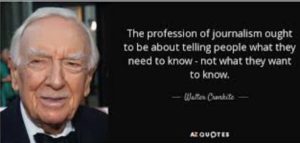
Walter Cronkite was the the most serious of serious journalists. The former CBS anchorman cared not just about the next story but about the future of reporting in a country where was known for the better part of a half century as “the most trusted name in news.” So it should come as little surprise that what worried Cronkite in the last years of his life was the collapse of journalistic quality and responsibility that came with the increasing dominance of newsgathering by a handful of media corporation.
Walter Cronkite was the the most serious of serious journalists.
The former CBS anchorman cared not just about the next story but about the future of reporting in a country where was known for the better part of a half century as “the most trusted name in news.”
So it should come as little surprise that what worried Cronkite in the last years of his life was the collapse of journalistic quality and responsibility that came with the increasing dominance of newsgathering by a handful of media corporations.
“I think it is absolutely essential in a democracy to have competition in the media, a lot of competition, and we seem to be moving away from that,” Cronkite told me the last time we spoke about media issues.
The definitional American anchorman, who has died at age 92, recognized that Americans would always need diverse and competing media outlets, with the resources and the skills to examine issues from a variety of perspectives — and to challenge entrenched power.
Cronkite was, almost by definition, an “old-media” man. He covered World War II, the Nuremberg trials, the Cold War, the Cuban Missile Crisis, the assassination of President Kennedy, the civil rights movement, the killing of the Rev. Martin Luther King Jr., the space race and the first moon landing and Watergate in a career that his successor in the CBS anchor chair, Dan Rather, said was characterized by “a passion for reporting and journalism.”
Yet, as his 20th century gave way to our 21st, Cronkite made common cause with media reformers who objected to corporate monopolies and the dumbed-down discourse fostered by big media outlets that were more concerned with commerce and entertainment than with civics and democracy.
Speaking of the relationship between media and democracy, Cronkite told me several years ago: “The way that works is to have multiple owners, with the hope that the owners will have different viewpoints, and with the hope that the debate will help to air all sides, or at least most sides of the issues. But right now I think we’re moving away from that approach.”
The reporter, editor and anchorman from 1962 to 1981, whose name remained synonymous with American journalism to the day he died, fretted in particular about a 2003 move by the Federal Communications Commission to relax media ownership rules. After the commission approved proposals that would permit a single media company to own television stations that reach up to 45 percent of American households, and that would permit a single media company to own the daily newspaper, several television stations and up to eight radio stations in the same community, Cronkite said, “I think they made a mistake, I do indeed. It seems to me that the rule change was negotiated and promulgated with the goal of creating even larger monopolies in the news-gathering business.”
The veteran television journalist was especially concerned about monopolies developing at the local level.
“We are coming closer to that (monopoly situations) today, even without the relaxation of the rules,” Cronkite said. “In many communities, we have seen a lot of mergers already and that is disturbing. We have more and more one-newspaper towns, and that troubles me. I think that the failure of newspaper competition in a community is a very serious handicap to the dissemination of the knowledge that the citizens need to participate in a democracy.”
Cronkite stepped down as the CBS anchor in 1981. But he remained active as a journalist well into the 21st century, writing a nationally syndicated column that appeared weekly newspapers across the country until just a few years ago.
It was as he was preparing that column that Cronkite and I got to know one another and began an ongoing conversation about the state of the media.
Much had changed since his days at the anchor desk, Cronkite said. And while he shied away from suggesting that everything was better in the good old days, he admitted that he was deeply troubled by the timidity of broadcast media when it came to questioning those in power.
In 1968, Cronkite stunned the nation when, after reporting from Vietnam on the Tet offensive and events that followed it, he went on air and openly questioned whether the U.S. military would ever prevail in that conflict.
“It seems now more certain than ever that the bloody experience of Vietnam is a stalemate,”Cronkite told his national audience. The anchorman went on to call for the government to open negotiations with the North Vietnamese.
Bill Moyers, who was President Lyndon Johnson’s press secretary, has speculated that Cronkite’s blunt assessment of the war contributed significantly to Johnson’s decision to propose negotiations and to drop out of the 1968 presidential race. (Moyers and Cronkite tangled in the 1960s, when the younger man was President Lyndon Johnson’s press secretary. But they eventually became so close that, when Moyers was honored for his lifetime of achievement as a broadcaster at the 2006 Emmy Awards, it was Cronkite who led the cheers.)
As the war in Iraq went horribly awry, I asked Cronkite whether a network anchorman would dare speak out in the same way that he had?
“I think it could happen, yes. I don’t think it’s likely to happen,” he said with an audible sigh. “I think the three networks are still hewing pretty much to that theory. They don’t even do analysis anymore, which I think is a shame. They don’t even do background. They just seem to do headlines, and the less important it seems the more likely they are to get on the air.”
In an era of increasing globalization and speed of communications, Cronkite frequently suggested in our conversations that the networks should be airing hour-long evening news programs. “For a country this big and this powerful and this diverse, a full hour is necessary,” he explained. “To try to cover that in 19 minutes is simply impossible.”
Cronkite also argued that the networks needed to get more comfortable with criticism. He believed that, after years of battering by conservative media critics, the networks were too averse to taking risks. During the discussion about whether a network anchor might question the wisdom of the Iraq war, he said, “If they (the networks) didn’t do it, I think it would be because they are afraid to get in an ideological fight – or that doing so might lose them some viewers. … I think that is a bad thing, a bad way to decide how to approach a story.”
But what about Cronkite? Did he think that, if he were an anchorman today, he would have spoken out against the Iraq war?
“Yes, yes I do. I think that right now it would be critical to do so,” he told me a few months after the invasion in 2003. “I think that right now we are in one of the most dangerous periods in our existence. Not since the Civil War has the state of our democracy been so doubtful. Our foreign policy has taken a very strange turn. And I do think I would try to say something about that.”
What exactly would Cronkite have told America from the CBS anchor desk?
He said he would have suggested that the Bush administration had “confused” aggressive with defense and force with democracy.
“The policy we’re following has involved us in a very expensive set of projects trying to export democracy at the end of a bayonet,” he said. “That has caused a great deal of concern around the world and I think Americans need to understand this.”
In particular, Cronkite said, he would have bluntly discussed his concerns about Bush’s view of when it is appropriate to make war.
“Preventive war is a theory, a policy, that was put forth by the president in his policy address,” Cronkite observed. “It upsets all of our previous concepts about the use of power. It is particularly worrying when our power is almost unchallenged around the world. It seems to me that this preventive action is a terrible policy to put forth to other nations. If we are viewed as a pacesetter by other nations, this is a policy that could lead to eternal war around the world. If every small nation with a border dispute believes they can go ahead and launch a pre-emptive war and that it will be approved by the greatest power, that is a very dangerous thing.”
To Cronkite’s view, Bush was a distinctly aggressive president. “I actually knew Herbert Hoover, believe it or not. And my time as a journalist goes back to Franklin Roosevelt. In my time, I don’t think we have had any president as aggressive, except possibly Roosevelt. With Roosevelt, there was in his time a call for leadership, which he gave us. With this White House, they are aggressive on all fronts, whether there is a call for leadership or not.”
At the same time, Cronkite said, the U.S. Congress had grown too pliant. Asked about the congressional debate on the Iraq war, he asked rhetorically, “What debate?”
Cronkite was heartened as the years passed and more members of Congress challenged the executive branch. He delighted when younger journalists, many of them working in new media, began to ask tougher questions and make blunter statements. He appreciated bloggers and independent media producers who used documentaries and YouTubes to hold the powerful to account.
Still, he recognized the lingering power of television in our society. And Cronkite continued to worry that broadcast news — his medium — had grown too deferrent to power, too stenographic, too consolidated.
“I don’t know if I am in a position to encourage Congress one way or another,” the old anchorman said. “However, if I were going to offer my opinion on the thing, I would certainly express my feeling that it would be better to have multiple ownership.”
Walter Cronkite said he would, as well, remind the powerful that the role of journalism is not to tell Americans what they want to hear but what they need to know as citizens — because, he said, “journalism is what we need to make democracy work.”





